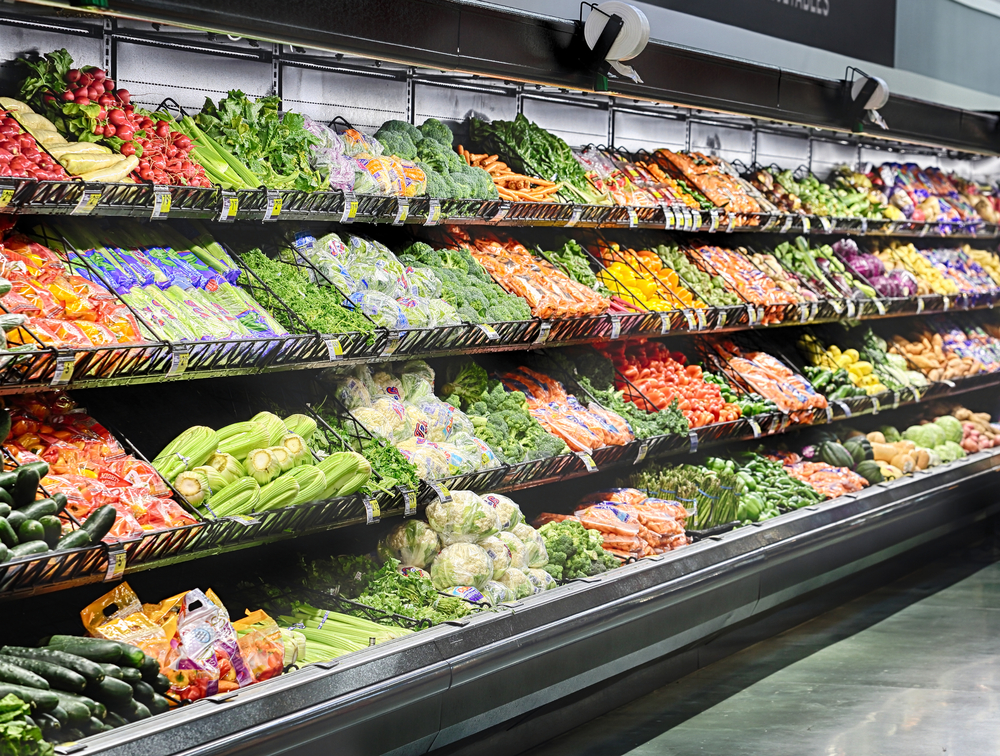Part of the Food Policy Snapshot Series
Policy name: Plastic packaging ban for fruits and vegetables
Overview: In an effort to protect the environment, starting on January 1, 2022, most fruits and vegetables in France will be sold without plastic packaging.
Location: France
Population: 65.5 million
Food policy category: Climate change, environmental health, preventative health care
Program goals: To reduce plastic waste, to protect the environment, and to protect human health.
How it works: Approximately 30 fruits and vegetables, including potatoes, leeks, eggplant, peppers, cucumbers, tomatoes, onions, cabbage, cauliflower, carrots, apples, pears, kiwi, plums, pineapple, mango, passion fruit, oranges, lemons, and grapefruit, will no longer be packaged in plastic when sold in quantities of less than 1.5 kilograms (3.3 pounds).
Cut fruit and some delicate produce such as peaches, berries, and cherry tomatoes, will still be sold in plastic for now. By the end of June 2023, however, plastic packaging will also be banned for cherry tomatoes, green beans, and peaches, and by the end of 2024, plastic packaging must also be removed from asparagus, mushrooms, cherries, and some salads and herbs. Finally, by the end of 2026, all berries will have to be sold without plastic packaging.
To replace the plastic, retailers and consumers are encouraged to switch to either cardboard packaging or, preferably, reusable bags and containers.
Distributors will have a six-month grace period before they start being fined up to €15,000 (approximately $17,400) for failure to comply with the law.
Progress to date: On February 10, 2020, French President Emmanuel Macron passed a law intended to reduce waste, with goals to recycle all plastics by 2025 and eliminate single-use plastics completely by 2040. Specific provisions to support these goals, including:
- A ban on plastic straws and cutlery, as well as styrofoam take-out containers that began at the start of 2021,
- Starting in 2022, plastic packaging for fruits and vegetables will be banned, and any building open to the public will have to include a water fountain.
- In 2023, fast-food restaurants will not be allowed to provide disposable plates or cups for in-house dining.
Why it is important: According to a 2019 World Wildlife Fund report, France is the largest producer of plastic waste in the Mediterranean region, with only 22 percent of plastics being recycled and 3.4 metric tons ending up in landfills or incinerators.
Not only is plastic pollution harmful to marine life and the fishing industry, but France’s plastic waste also produces more than 35 metric tons of carbon dioxide emissions. Carbon dioxide is the primary greenhouse gas produced by human activity, and greenhouse gas emissions are largely responsible for climate change. Rising atmospheric temperature is affecting food systems by making it more difficult to produce safe and nutritious food, thereby reducing food security.
Furthermore, exposure to a group of chemicals called phthalates, which are used to make plastic more durable, may contribute to early death among older adults.
It is important to reduce or eliminate plastic packaging in order to protect the environment, improve food security, and maintain human health.
Program/Policy initiated: The policy goes into effect starting on January 1, 2022.
Point of contact: N/A
Similar practices: A variety of single-use plastic bans are becoming more common throughout the world. For example:
- By the end of 2021, Canada will have banned many single-use plastics, including grocery bags, straws, cutlery, take-out containers, and six-pack rings.
- Kenya has outlawed single-use plastic bags and does not allow plastics in national parks, forests, beaches, or conservation areas.
- China is in the process of phasing out single-use plastics such as plastic bags, straws, cutlery, and take-out containers.
- In the U.S., California, Connecticut, Delaware, Hawaii, Maine, New York, Oregon and Vermont have banned single-use plastic bags.
Evaluation: Evaluation has not yet been conducted.
Learn more:
- The Environmental Impact of Food Packaging (FoodPrint)
- Single-Use Plastics 101 (Natural Resources Defense Council)
- UN Resolution Pledges to Plastic Reduction by 2030 (BBC)
- The World’s Plastic Pollution Crisis Explained (National Geographic)
References:
- The 30 Fruits and Vegetables France is Banning Plastic Packaging For (The Local)
- As Canada Bans Bags and More, This is What’s Happening with Single-Use Plastics Around the World (World Economic Forum)
- Canada Will Ban Single-Use Plastic Items By the End of Next Year (CNN)
- Chemicals Used in Packaging May Play Role in 100,000 US Deaths a Year – Study (The Guardian)
- China Moves to Phase Out Single-Use Plastics (Reuters)
- Climate Change and the Future of Food (United Nations Foundation)
- Climate Change, Global Food Security, and the U.S. Food System (United States Department of Agriculture)
- France is Banning Plastic Packaging for 30 Fruits and Vegetables From 2022 (Vegan Food and Living)
- France: New Anti-Waste Law Adopted (Library of Congress)
- France Plans To Eliminate Plastic Wrapping For Fruits And Vegetables In Four Years (Forbes)
- Kenya Bans Single-Use Plastics in Protected Areas (UN Environment Programme)
- New Law in France Will Save 1 Billion Pieces of Single-Use Plastic Annually (World Economic Forum)
- Overview of Greenhouse Gases (Environmental Protection Agency)
- Phthalates and Attributable Mortality: A Population-Based Longitudinal Cohort Study and Cost Analysis (Environmental Pollution)
- A Plastic System Guidebook for France (World Wildlife Fund)
- State Plastic Bag Legislation (National Conference of State Legislatures)


